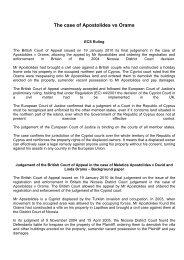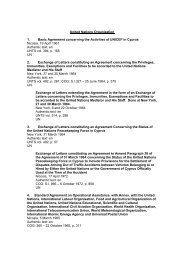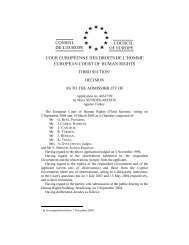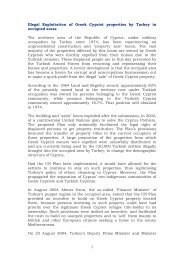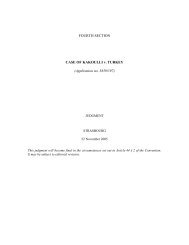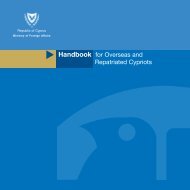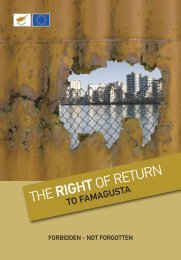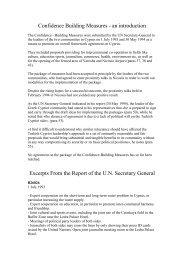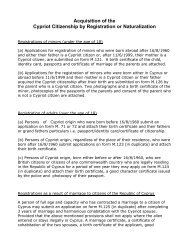European Court of Human Rights Case of Loizidou v. Turkey
European Court of Human Rights Case of Loizidou v. Turkey
European Court of Human Rights Case of Loizidou v. Turkey
Create successful ePaper yourself
Turn your PDF publications into a flip-book with our unique Google optimized e-Paper software.
21. In the submission <strong>of</strong> the Turkish Government they cannot be held liable in international law for the<br />
acts <strong>of</strong> the “Turkish Republic <strong>of</strong> Northern Cyprus”. There is no legal basis for holding <strong>Turkey</strong> liable as<br />
it is well settled in international law that the first condition that has to be satisfied for a State to incur<br />
liability is that the unlawful act or conduct is attributable to the State on whose behalf the perpetrator <strong>of</strong><br />
the unlawful act or conduct was acting.<br />
Regard should be had to the fact that the Commission has accepted, even in cases where the allegedly<br />
unlawful act resulted directly from the actions <strong>of</strong> a national authority, that a national authority cannot<br />
incur liability where jurisdiction in the relevant sphere has been transferred to an international<br />
organisation (see M. and Co. v. Germany, Decisions and Reports, vol. 64, p. 139).<br />
Any power that <strong>Turkey</strong> has in Cyprus is derived from the Zürich and London Agreements <strong>of</strong> 1959 and<br />
the treaties signed in 1960, which remain in force. Subsequent agreements or texts (such as the Geneva<br />
Declaration <strong>of</strong> 30 August 1974, the “ten-point” agreement <strong>of</strong> 1979 or the Set <strong>of</strong> Ideas <strong>of</strong> 1992) have not<br />
conferred any new responsibilities on <strong>Turkey</strong>. The activity complained <strong>of</strong>, in other words the alleged<br />
unlawful act, must result directly from an act attributable to the State, whether it be an administrative<br />
act, an act <strong>of</strong> the military authorities, <strong>of</strong> the legislature or <strong>of</strong> the judiciary. There is no case where a<br />
third-party State has been held liable for the acts <strong>of</strong> another State – whether or not such State is<br />
recognised – which exercises effective authority through constitutionally established organs.<br />
It would therefore be incompatible with principles <strong>of</strong> international law to award compensation against<br />
<strong>Turkey</strong>.<br />
In addition, the Turkish Government stressed that the question <strong>of</strong> property rights and reciprocal<br />
compensation is the very crux <strong>of</strong> the conflict in Cyprus. These issues can only be settled through<br />
negotiations and on the basis <strong>of</strong> already agreed principles <strong>of</strong> bi-zonality and bi-communality. Inevitably<br />
the principle <strong>of</strong> bi-zonality will involve an exchange <strong>of</strong> Turkish Cypriot properties in the south with<br />
Greek Cypriot properties in the north, and if need be, the payment <strong>of</strong> compensation for any difference.<br />
An award under Article 50 would undermine the negotiations between the two communities and would<br />
spoil the efforts to reach a settlement on the basis <strong>of</strong> agreed principles and criteria.<br />
In conclusion, it was submitted that compensation was not “necessary” under the terms <strong>of</strong> Article 50.<br />
Moreover the claim should be disallowed on the basis that this provision requires that the “decision” or<br />
“measure” involved be that <strong>of</strong> a “High Contracting Party”. For the reasons given above that was not the<br />
situation in the present case.<br />
22. The applicant pointed out that the <strong>Court</strong>’s principal judgment on the merits had established that<br />
there was a continuous breach <strong>of</strong> Article 1 <strong>of</strong> Protocol No. 1 which was imputable to <strong>Turkey</strong>. In<br />
accordance with the principle ubi ius ibi remedium it was necessary to make an award to ensure that the<br />
applicant was not left without a remedy.<br />
23. The Cypriot Government emphasised that Article 50 proceedings do not constitute an appeal from<br />
the <strong>Court</strong>’s judgments on the preliminary objections and the merits. It was not open to those appearing<br />
before the <strong>Court</strong> to seek to relitigate issues upon which the <strong>Court</strong> had already decided. Article 50 was<br />
applicable in the present case since no reparation had been made by the Turkish Government in respect<br />
<strong>of</strong> the violation <strong>of</strong> the applicant’s property rights.<br />
24. The Delegate <strong>of</strong> the Commission also maintained that the applicant should receive just satisfaction.<br />
The fact that political efforts were being made to resolve the “Cyprus problem” was not a valid reason<br />
for refusing to make an award.<br />
25. The <strong>Court</strong> recalls its finding in paragraph 57 <strong>of</strong> its principal judgment on the merits in the present<br />
case “that the continuous denial <strong>of</strong> the applicant’s access to her property in northern Cyprus and the<br />
ensuing loss <strong>of</strong> all control over the property is a matter which falls within <strong>Turkey</strong>’s ‘jurisdiction’ within<br />
the meaning <strong>of</strong> Article 1 and is thus imputable to <strong>Turkey</strong>” (the principal judgment, Reports <strong>of</strong><br />
Judgments and Decisions 1996-VI, p. 2236).





